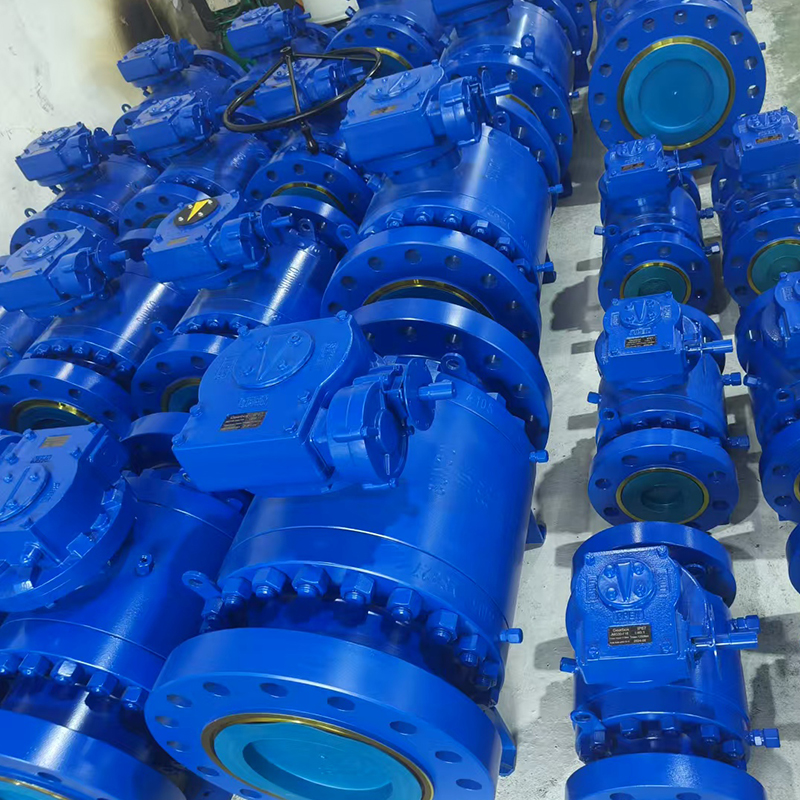
Overview of Trunnion Ball Valves
Trunnion ball valves are characterized by a ball that is fixed in position by trunnion supports at the top and bottom. This design reduces the load on the valve seats and ensures reliable sealing, even in high-pressure environments. Trunnion ball valves are typically used in oil and gas pipelines, petrochemical processing plants, water systems, and power generation facilities.

Both cast steel and forged steel versions of trunnion ball valves share this same structural advantage, but they differ in how they are produced and in the mechanical properties of the resulting valve body.
Two-Piece Cast Steel Trunnion Ball Valve
The Two-Piece Cast Steel Trunnion Ball Valve is manufactured by pouring molten steel into molds to form the valve body. This casting process allows for complex shapes and larger sizes to be produced more economically, especially for valves with wide diameters.
A two-piece design consists of a main body and a body cap, typically bolted together. This configuration simplifies maintenance and internal component access while maintaining a strong and reliable pressure boundary.
Key Features:
Cost-Effective for Large Sizes: Cast steel is more economical for large-diameter valves due to the efficiency of the casting process.
Design Flexibility: Casting allows for complex internal geometries, which may enhance flow characteristics.
Material Variety: Cast steel valves are available in a range of grades (e.g., ASTM A216 WCB for general service, ASTM A351 CF8M for corrosion resistance).
Limitations:
Porosity Risks: Casting can result in internal defects like porosity or shrinkage cavities if not properly controlled.
Lower Strength: Cast steel has slightly lower tensile strength compared to forged steel, making it less ideal for high-pressure conditions.
Applications for the Two-Piece Cast Steel Trunnion Ball Valve include general industrial pipelines, water treatment systems, and moderate-pressure oil and gas transport lines.
Forged Steel Trunnion Ball Valve
The Forged Steel Trunnion Ball Valve is created by compressing solid metal under high pressure to form the valve body. This forging process results in a denser, more uniform material structure with improved mechanical properties.
Forged steel valves are known for their high strength, resistance to pressure-induced deformation, and grain flow alignment, which enhances durability. These valves are typically used in high-pressure or high-temperature applications where reliability is critical.
Key Features:
High Mechanical Strength: Forged steel provides tensile and yield strength, reducing the risk of failure under pressure.
Improved Integrity: The forging process minimizes internal voids or inclusions, resulting in a more robust structure.
Compact Design: Forged valves are often more compact than cast versions due to the reduced wall thickness required for the same pressure ratings.
Limitations:
Higher Cost: The forging process and machining of forged components typically make these valves more expensive.
Size Limitations: Forged steel valves are generally more suitable for small to medium sizes due to forging equipment constraints.
The Forged Steel Trunnion Ball Valve is preferred in critical applications such as high-pressure natural gas pipelines, offshore platforms, and high-temperature steam systems.
Choosing Between Cast and Forged Steel Trunnion Ball Valves
Selecting between a Two-Piece Cast Steel Trunnion Ball Valve and a Forged Steel Trunnion Ball Valve depends on multiple factors, including:
Operating Pressure and Temperature: Forged steel is more suitable for conditions, while cast steel works well in moderate applications.

